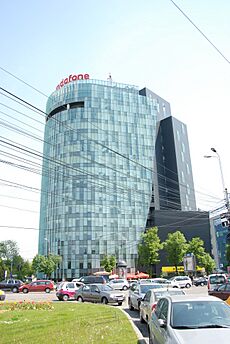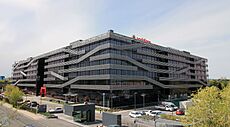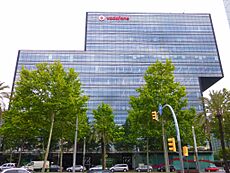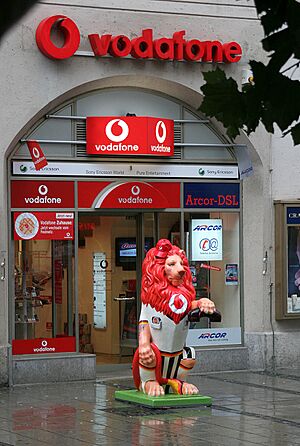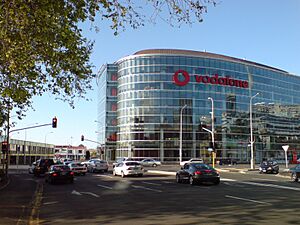Vodafone facts for kids
 |
|
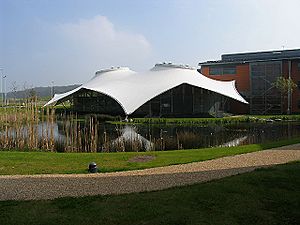
Vodafone headquarters in Newbury
|
|
|
Formerly
|
|
|---|---|
| Public | |
| Traded as |
|
| ISIN |
|
| Industry | Telecommunications |
| Founded | 17 July 1984 |
| Founders |
|
| Headquarters | Newbury, Berkshire, England, UK |
|
Area served
|
Worldwide |
|
Key people
|
|
| Products |
|
| Revenue | |
|
Operating income
|
|
| Total assets | |
| Total equity | |
|
Number of employees
|
93,000 (2025) |
| Subsidiaries |
List
|
Vodafone Group Public Limited Company is a big British company that provides phone and internet services. Its main office is in Newbury, England. Vodafone offers services in many parts of the world. These include Asia, Africa, Europe, and Oceania.
As of January 2025, Vodafone runs its own networks in 15 countries. It also works with partner networks in 46 other countries. Vodafone's business section, Vodafone Global Enterprise, helps large companies with their phone and IT needs in 150 countries.
Vodafone is listed on the London Stock Exchange. This means its shares can be bought and sold there. It is also part of the FTSE 100 Index, which lists the 100 largest companies on the London Stock Exchange.
Contents
What Does Vodafone Mean?
The name Vodafone comes from combining "voice," "data," and "fone" (a short way of saying "telephone"). The company chose this name to show that they provide both voice calls and internet data services on mobile phones.
Vodafone's Journey Through Time
Starting as Racal Telecom: 1980 to 1991
In 1980, Ernest Harrison led Racal Electronics Plc. This company made military radios. He worked with Lord Weinstock of GEC to use some of GEC's radio technology. Harrison asked Gerry Whent to see if this technology could be used for everyday people.
In 1981, Racal Strategic Radio Ltd was created. In 1982, Racal teamed up with Millicom Inc. to get a licence for a new mobile phone network in the UK. Racal owned most of this new company, Racal-Millicom Ltd.
Vodafone officially started on January 1, 1985. It was first called Racal-Vodafone (Holdings) Ltd. The first mobile phone call in the UK on this network was made by comedian Ernie Wise. By 1986, Vodafone became fully owned by Racal. In 1991, Racal separated Vodafone into its own company.
Becoming Vodafone Group: 1991 to 1999
On September 16, 1991, Vodafone Group Plc became a separate company. Gerry Whent was its first CEO.
Vodafone grew by buying other phone companies. In 1996, they bought Talkland and Peoples Phone. These purchases helped Vodafone get more customers.
In 1997, Chris Gent became the new CEO. That same year, Vodafone introduced its famous "Speechmark" logo. It looks like a quotation mark in a circle. This design suggests conversation.
Vodafone AirTouch: 1999 to 2000
In 1999, Vodafone bought AirTouch, an American service provider. The company then changed its name to Vodafone AirTouch Plc. This deal gave Vodafone a big share in Mannesmann, a German mobile network.
Vodafone also joined forces with Bell Atlantic Corp. to create Verizon Wireless in the US. This merger was completed in April 2000.
Later in 1999, Vodafone tried to buy Mannesmann. Mannesmann had bought Orange, a UK mobile operator. This made Vodafone want Mannesmann even more. After a big effort, Vodafone bought Mannesmann for £112 billion in February 2000. This was the largest company merger ever at that time. Vodafone then had to sell the Orange brand to get approval for the merger.
Vodafone Group: 2000 to Present
On July 28, 2000, the company went back to its original name, Vodafone Group Plc.
In 2001, Vodafone started "partner networks." This meant they could offer Vodafone services in new countries without owning the local network. They would team up with local companies.
Vodafone has sponsored famous sports teams. They sponsored the football team Manchester United F.C. from 2000 to 2006. They also sponsored the McLaren Formula One racing team from 2007 to 2013.
In 2012, Vodafone bought Cable & Wireless Worldwide (CWW). This gave Vodafone access to CWW's fibre network. This helped Vodafone offer more services to businesses.
In 2013, Vodafone sold its 45% share in Verizon Wireless to Verizon Communications for $130 billion. This was a huge deal. Vodafone used some of this money to improve its networks around the world.
In January 2020, Vodafone left the Diem Association. This was a digital currency project started by Facebook.
In June 2023, Vodafone UK announced plans to merge with Three UK. Vodafone would own 51% of the new company. This merger would create a very large mobile network in the UK. Regulators approved this merger in December 2024. The approval came with conditions. Vodafone promised to invest in 5G and cap mobile prices for customers.
In June 2024, Vodafone sold some of its shares in Indus Towers, an Indian company. This helped Vodafone reduce its debt. In November 2024, Vodafone sold its remaining shares in Indus Towers. This was part of its plan to focus on its main markets.
In December 2024, Vodafone UK and Three UK officially merged. This created the largest mobile network in the UK.
Where Vodafone Operates
Vodafone has expanded globally. In recent years, it has also simplified its operations.
Africa
| Majority-owned | Minority-owned | Partner networks | ||||
|---|---|---|---|---|---|---|
| DR Congo* | Egypt* | Ethiopia | Ghana | |||
| Kenya* | Lesotho* | |||||
| Mozambique* | South Africa* | |||||
| Tanzania* | ||||||
| * Majority stakes held through majority-owned Vodacom Group | ||||||
Vodafone has a strong presence in Africa. For example, the Vodafone Egypt network started in 1998. In 2008, Vodafone bought a big share in Ghana Telecom. This company was later renamed Vodafone Ghana. In 2023, Vodafone sold its share in Vodafone Ghana.
In South Africa, Vodafone works with Vodacom. Vodacom offers Vodafone's international services. Vodafone increased its ownership in Vodacom over the years. Vodacom is now listed on the JSE Limited stock exchange.
Middle East
| Partner networks |
|---|
| Oman |
| Qatar |
Vodafone has partner networks in the Middle East. In 2003, they partnered with MTC group in Bahrain. In 2007, Vodafone won a licence to operate in Qatar. This became "Vodafone Qatar." In 2018, Vodafone Europe sold its share in this company.
In January 2021, Vodafone got a licence to operate in Oman. They are building new 4G and 5G networks there.
The Americas
| Partner networks | ||||||
|---|---|---|---|---|---|---|
| Argentina | ||||||
| Canada | ||||||
| Chile | ||||||
| Peru | ||||||
| USA* | ||||||
| * Enterprise Only | ||||||
In the Americas, Vodafone has partner networks. In Canada, their partner is Telus. In Chile, they work with Entel PCS Chile. This gives Vodafone access to many customers.
In the United States, Vodafone used to own a large part of Verizon Wireless. However, Vodafone sold its share to Verizon Communications in 2013.
Asia
| Joint Venture | Partner Networks | ||||
|---|---|---|---|---|---|
| India | Japan | Singapore | South Korea | ||
| Taiwan | |||||
Vodafone has a significant presence in Asia. In India, Vodafone bought a controlling share in Hutch Essar in 2007. This company was later renamed Vodafone India. In 2017, Vodafone merged its Indian business with Idea Cellular. This created Vodafone Idea, one of India's largest phone companies. In 2020, Vodafone Idea launched a new brand called 'Vi'.
In Japan, Vodafone bought J-phone in 2003. It became 'Vodafone Japan'. However, Vodafone sold its Japanese business to SoftBank in 2006.
Vodafone also has partner networks in other Asian countries. These include Singapore, Taiwan, and Thailand.
Europe
| Majority-owned | Partnerships | |||||
|---|---|---|---|---|---|---|
| Albania | Czech Republic | Austria | Azerbaijan | Belgium | Bosnia & Herzegovina | |
| Germany | Greece | Bulgaria | Channel Islands | Croatia | Cyprus | |
| Ireland | Netherlands | Denmark | Estonia | Finland | France | |
| Northern Cyprus (indirectly owned) |
Portugal | Georgia | Hungary | Iceland | Italy | |
| Romania | Turkey | Latvia | Lithuania | Luxembourg | Montenegro | |
| United Kingdom | North Macedonia | Norway | Serbia | Slovenia | ||
| Spain | Sweden | Switzerland | Ukraine | |||
Vodafone has many operations in Europe. In 2000, Vodafone bought Mannesmann AG. This gave them companies in Germany and Italy. In 2001, Vodafone bought Eircell in Ireland. It was later renamed Vodafone Ireland.
Vodafone also has partner agreements across Europe. These include countries like Austria, Bulgaria, and Iceland. In 2005, Vodafone bought Oskar, a Czech mobile operator. It became Oskar-Vodafone. Vodafone also bought Telsim in Turkey in 2005. It was later renamed Vodafone Turkey.
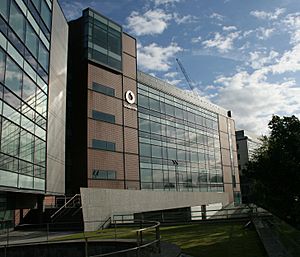
In 2013, Vodafone bought Kabel Deutschland, a German cable company. In 2014, they bought ONO, a Spanish cable operator. In 2015, MTS Ukraine was rebranded to Vodafone Ukraine. In 2016, Vodafone's Dutch operations merged with Liberty Global's Ziggo. This created VodafoneZiggo.
Recent Changes in Europe
Since 2019, Vodafone has been making changes to its European business. They have sold parts of their business and created new separate companies. In 2019, Vodafone sold its share in Vodafone Malta.
Vodafone also created a separate company for its mobile towers in Europe. This company is called Vantage Towers. It is based in Germany.
In 2023, Vodafone sold its shares in Vodafone Ghana and Vodafone Hungary. In June 2023, Vodafone announced its plan to merge Vodafone UK with Three UK. This merger was approved in December 2024.
In September 2023, Vodafone also announced plans to sell Vodafone España. This sale was completed in May 2024. In March 2024, Swisscom agreed to buy Vodafone Italia. This deal was completed in December 2024.
Oceania
| Minority-owned | Partner networks | ||
|---|---|---|---|
| Australia | Cook Islands | Fiji | |
| French Polynesia | Kiribati | ||
| New Zealand | Papua New Guinea | ||
| Samoa | Vanuatu | ||
Australia
Vodafone Australia started its network in 1993. In 2009, Vodafone Australia merged with 3/Hutchison. They formed a new company called VHA Pty Ltd. This company offers products under the Vodafone brand. In 2020, VHA merged with TPG to create TPG Telecom Limited.
Fiji
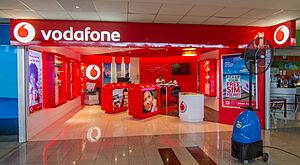
Vodafone Fiji's network started in 1994. In 2014, Vodafone sold its share in Vodafone Fiji. However, Vodafone Fiji still uses the Vodafone brand name.
New Zealand
Vodafone bought BellSouth New Zealand in 1998. It later became Vodafone New Zealand. In 2019, Vodafone sold its New Zealand business to a group of investors. This made it independent from the main Vodafone company. Vodafone New Zealand changed its name to One New Zealand in April 2023.
Vodafone Global Enterprise
Vodafone Global Enterprise is a special part of Vodafone Group. It helps large companies with their phone and IT services. It started in 2007.
This division offers many services. These include phone calls, internet data, and cloud computing. They also help with mobile payments.
Vodafone Global Enterprise works in over 65 countries. Some of its big customers are Deutsche Post and Volkswagen Group.
Products and Services
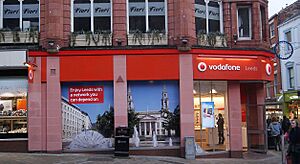
In 2009, Vodafone launched Vodafone 360. This was an internet service for phones, PCs, and Macs. It was stopped in 2011. In 2010, Vodafone launched a very cheap mobile phone, the Vodafone 150. It was meant for developing countries.
Mobile Money Transfer Services
In 2007, Safaricom in Kenya launched M-PESA. This is a mobile payment system developed by Vodafone. It lets people send and receive money using their phones. By 2008, M-PESA had 1.6 million customers in Kenya. It became very popular.
Vodafone later brought this service to other countries. These included Afghanistan, Tanzania, South Africa, and India. In 2012, Vodafone also partnered with Visa.
Health Services
In 2009, Vodafone started a new business unit for healthcare. They use mobile technology to help people's health. One example is the "SMS for Life" project in Tanzania. Vodafone helped create a system where health facilities could report their medicine levels using text messages. This helped make sure medicines were always in stock.
Vodafone Foundation
The Vodafone Foundation is a charity. It uses mobile technology to help people in need. Its slogan is "Connecting for Good." They work with other charities on many projects.
- DreamLab is a mobile app. It uses your phone's power to help research cancer and other diseases.
- TECSOS provides special mobile phones. These phones help victims of domestic violence contact emergency services quickly.
- The World of Difference programme helps people work for charities. Vodafone provides money for their salary and for the charity.
Advertising
Since 2021, Vodafone's global advertising slogan has been "Together We Can." Before that, it was "The future is exciting. Ready?" (2017) and "Power to You" (2009).
Sponsorships
Vodafone has sponsored many sports teams:
- S.L. Benfica (1996–2005)
- Manchester United F.C. (2000–2006)
- Scuderia Ferrari (2002–2006)
- Al Ahly SC (2002–2017)
- Olympiacos F.C. (2006–2009)
- McLaren (2007–2013)
- Beşiktaş J.K. (2014–2020)
- Borussia Dortmund (2025–Present)
Corporate Leadership
Senior Management
Sir Gerald Whent was key in getting Vodafone its first UK mobile network licence. He became the first Chief Executive of Racal Telecom plc in 1988. The company later became Vodafone Group plc.
Sir Christopher Gent took over as CEO in 1997. He helped Vodafone grow into a global company. This happened through big mergers with AirTouch and Mannesmann.
Arun Sarin then led Vodafone's expansion into new markets like Asia and Africa. He oversaw purchases like Telsim in Turkey and a large share in Hutchison Essar in India.
Vittorio Colao became CEO in July 2008. The current CEO is Margherita Della Valle.
| No. | Chief Executive | Tenure |
|---|---|---|
| 1 | Sir Gerald Whent | October 1988 – December 1996 |
| 2 | Sir Christopher Gent | January 1997 – July 2003 |
| 3 | Arun Sarin | July 2003 – July 2008 |
| 4 | Vittorio Colao | July 2008 – September 2018 |
| 5 | Nick Read | October 2018 – December 2022 |
| 6 | Margherita Della Valle | January 2023 – present |
Financial Overview
Vodafone shares its financial results every year. Here's a look at how the company has performed:
| Year ended 31 March | Turnover €m | Profit before tax €m | Profit for the year €m | Basic eps (cents) |
|---|---|---|---|---|
| 2025 | 37,448 | (1,478) | (3,746) | (15.86) |
| 2024 | 36,717 | 1,620 | 1,505 | 4.45 |
| 2023 | 45,706 | 12,816 | 12,335 | 42.77 |
| 2022 | 45,580 | 3,954 | 2,624 | 7.20 |
| 2021 | 43,809 | 4,400 | 536 | 0.38 |
| 2020 | 44,974 | 795 | (455) | (3.13) |
| 2019 | 43,666 | (2,613) | (7,644) | (16.25) |
| 2018 | 46,571 | 3,878 | 2,788 | 15.87 |
| 2017 | 47,631 | 2,792 | (6,079) | (7.83) |
| 2016 | 49,810 | (190) | (5,122) | (20.27) |
| 2015 | 48,385 | 1,734 | 7,477 | 28.72 |
Things People Have Criticized Vodafone For
Customer Service Issues
Vodafone has faced criticism for its customer service. In Australia, around 2010, many people complained about poor service. This led to the nickname "Vodafail." In response, Vodafone worked to improve its network.
In the UK, consumer groups have also rated Vodafone's customer service as lower than other providers in some surveys.
Rules and Fines
In October 2016, Vodafone was fined £4.6 million by Ofcom. This was for not following consumer protection rules.
In 2017, a study found that Vodafone and other companies were not lowering customers' bills after their contracts ended. This meant customers were paying more than they should have.
Network Access During Protests
During protests in Egypt in 2011, Vodafone was asked by the Egyptian government to shut down its phone and internet services. Vodafone followed these orders. The company said it had to obey the law. Vodafone also allowed the government to send messages to people's phones. Vodafone later said they had no choice but to send these messages. They also complained to the authorities about it.
Brand Identity
See also
 In Spanish: Vodafone para niños
In Spanish: Vodafone para niños
- List of mobile network operators of Europe
 | Aurelia Browder |
 | Nannie Helen Burroughs |
 | Michelle Alexander |


